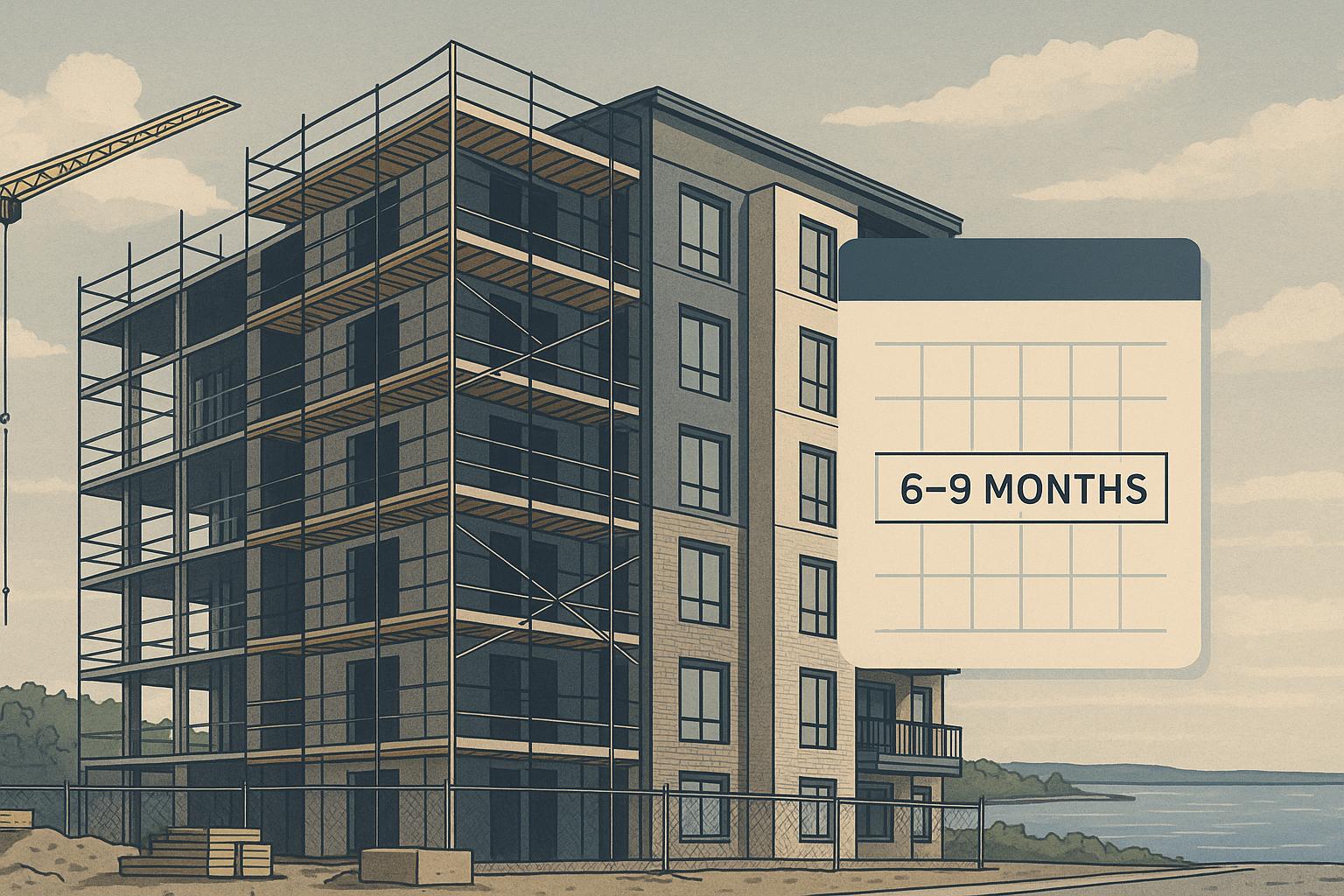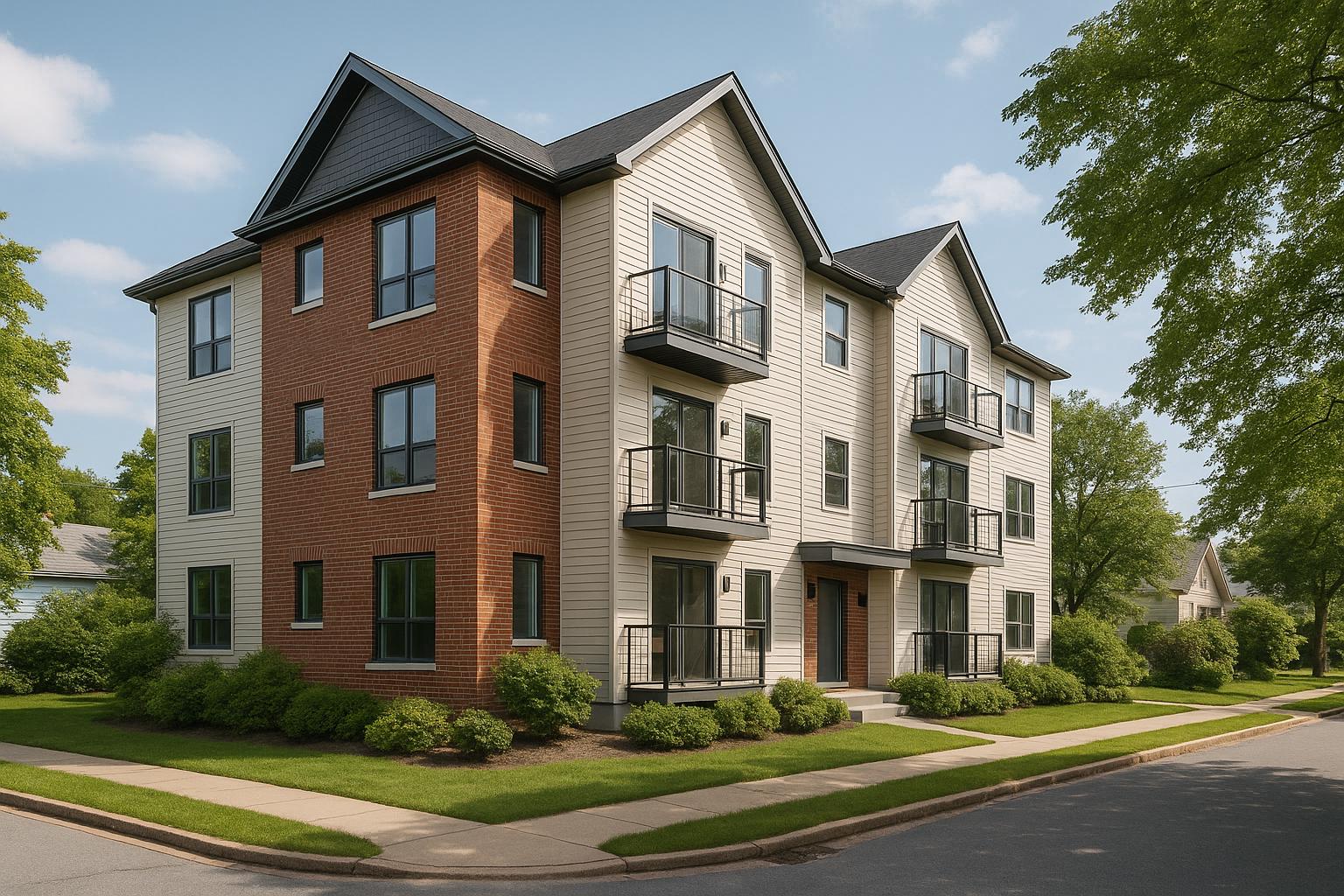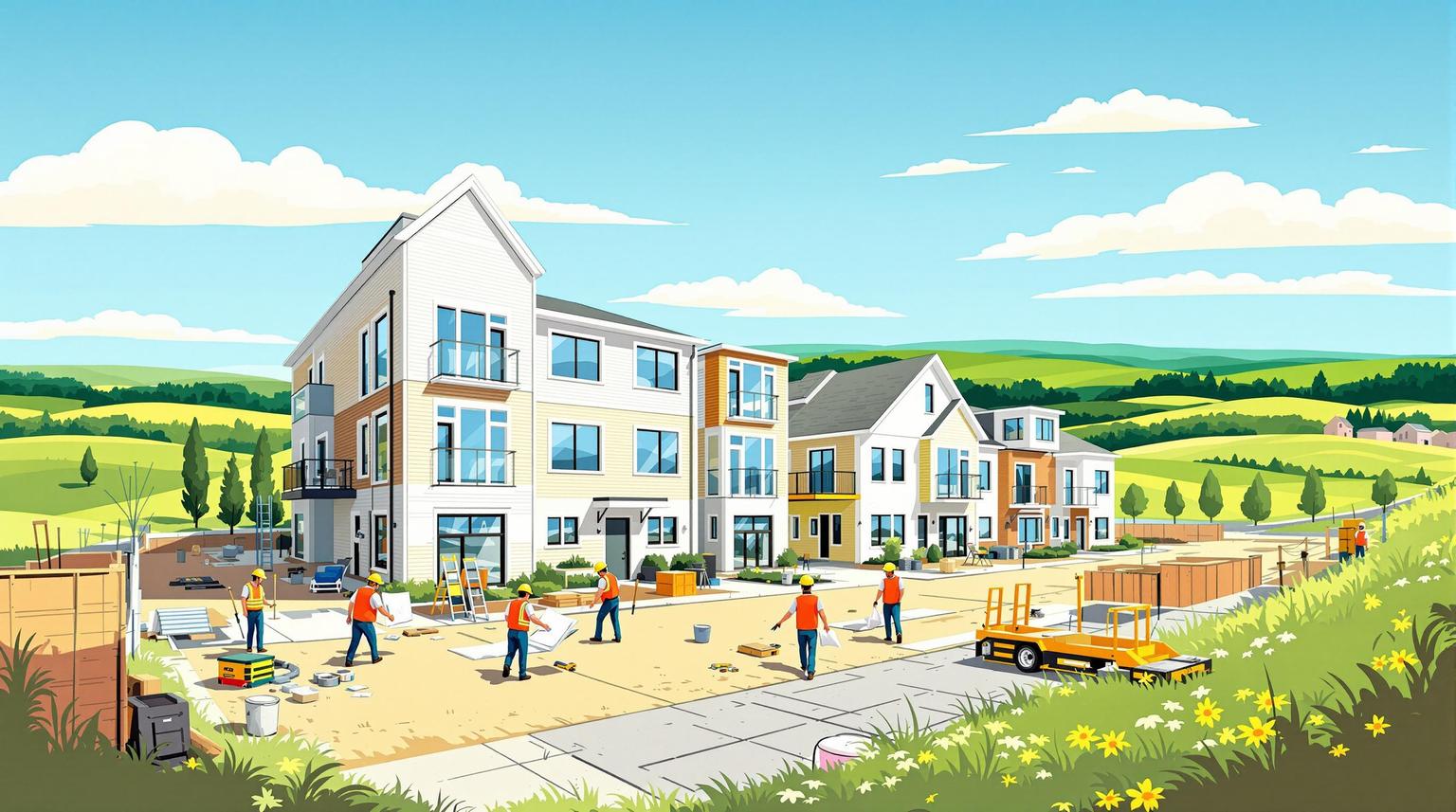Building a home in Nova Scotia can be challenging due to its coastal climate, strict building codes, and hidden costs. Here’s what you need to know to avoid costly mistakes:
- Budget Carefully: Site prep, permits, and unexpected expenses can add up. Base construction costs start at $168 per square foot.
- Follow Building Codes: Nova Scotia uses the National Building Code of Canada 2020. Hire qualified contractors and inspectors to avoid compliance issues.
- Choose the Right Contractor: Verify licences, insurance, and past projects to ensure quality work.
- Plan Thoroughly: Detailed project plans prevent delays and costly changes. Focus on foundation, HVAC, and electrical layouts.
- Use Durable Materials: Nova Scotia’s harsh weather demands energy-efficient windows, insulation, and HVAC systems.
Proper planning, budgeting, and professional help are key to a smooth construction process. Keep reading for detailed tips and local incentives to save money and build smarter.
Top Building Mistakes in Nova Scotia
Hidden Costs You Might Miss
Building a home in Nova Scotia involves more than just the base cost. Expenses like site preparation - land clearing, grading, and foundation work - can quickly add up. On top of that, you’ll need to account for assessments, development charges, and permit fees. Starting with a detailed budget can help you avoid surprises later.
Building Code and Permit Problems
Nova Scotia follows the National Building Code of Canada 2020, which enforces strict safety and construction standards. If you stray from approved plans, specifications, or manufacturers' instructions, you risk construction flaws, voided warranties, and even insurance complications. Hiring a third-party inspector during construction can help catch issues early, saving you money and headaches later. Beyond compliance, it’s also crucial to choose a contractor who respects these standards.
Choosing the Wrong Contractor
Working with an unqualified contractor can lead to major setbacks. Before hiring, confirm they have the necessary licences and insurance required in Nova Scotia. This includes valid Workers' Compensation and liability insurance. Skipping this step could cost you more in the long run.
Lack of Detailed Project Plans
Good project planning is key to staying on budget and on schedule. Incomplete plans can lead to costly change orders during construction. Common mistakes include missing foundation details for freeze-thaw cycles, incomplete mechanical layouts like HVAC, and inadequate electrical planning for modern needs. Taking the time to create thorough project plans can save you from unexpected issues later.
Using Subpar Materials
Nova Scotia’s tough climate demands durable materials. Cutting corners on quality can lead to higher costs over time. For example, investing in high-performance windows and insulation that meet strict thermal standards can reduce energy bills. Similarly, properly sized and designed HVAC systems are essential for staying comfortable and efficient during harsh winters.
How to Avoid These Mistakes
Budget Planning Steps
Start by listing all possible homebuilding expenses. Divide your budget into specific categories such as land and site preparation, foundation, structure and exterior, interior finishes, and mechanical systems. Don’t forget to allocate extra funds for unexpected costs, permit fees, development charges, and professional services like surveys and engineering reports. Basic construction costs typically begin at $168 per square foot, but site-specific factors can push this higher. Also, take time to thoroughly check your contractor’s credentials to safeguard your investment.
Contractor Verification Process
Experts recommend reviewing a contractor’s past projects and gathering feedback from previous clients to assess their work quality. Ask for references and confirm their credentials with local authorities to ensure they have the necessary licensing and experience.
Project Timeline Management
Managing timelines effectively requires clear communication and realistic scheduling. Collaborate with your builder to map out the entire timeline, including major phases like site prep, foundation work, framing, and interior finishing. Factor in extra time for permit approvals and potential weather delays, especially during the winter. Regular progress meetings can help address any issues as they arise.
Smart Material Selection
Select materials that can withstand Nova Scotia’s climate while improving energy efficiency. Prioritize a strong building envelope, advanced insulation techniques, and reliable moisture protection. Durable exterior finishes and energy-efficient materials may cost more upfront but can lead to significant savings over time through reduced maintenance and lower energy bills.
Building in Nova Scotia: Key Facts
Weather and Site Requirements
Nova Scotia's coastal setting requires careful attention to site preparation to ensure buildings remain stable over time. The process begins by removing the organic layer - this includes topsoil, roots, and decomposing vegetation - to reach solid ground. This step is crucial to avoid foundation problems later.
Proper drainage is another critical factor, which can be achieved by:
- Grading the site to direct water away from the building's foundation
- Installing effective ditching systems to manage surface water
- Using a 15 cm sub-base for fill and a 2.5 cm subgrade layer
- Applying crusher dust for accurate grading
Given these challenges, energy-efficient building techniques and related incentives are particularly appealing for homebuilders in Nova Scotia.
Available Building Incentives
Nova Scotia offers several programs to encourage energy-efficient home construction. While the Canada Greener Homes Grant is no longer accepting new applications, other helpful options are still available:
| Program | Benefit | Details |
|---|---|---|
| First-time Home Buyers' Rebate | Up to $3,000 | For newly built homes |
| Canada Greener Homes Loan | Up to $40,000 | Interest-free loans for energy-saving features |
| Home Energy Assessment (HEA) | Ongoing support | Delivered through Efficiency Nova Scotia |
Efficiency Nova Scotia provides valuable resources for energy-efficient construction. Their expertise can help you make the most of these incentives while ensuring your home aligns with local requirements.
sbb-itb-16b8a48
Pros and Cons of New Builds in Nova Scotia
Conclusion
Building a home in Nova Scotia requires careful planning to avoid unnecessary expenses and setbacks. As Ecohome puts it:
"This is, without a doubt, the starting point to a successful build - don't underestimate the time and money it will take to complete a build or renovation" [1].
To ensure your project goes smoothly, focus on these three key areas:
- Financial Planning: Develop a thorough budget that accounts for site preparation, permits, and a contingency fund for unexpected costs.
- Quality Materials: Invest in durable finishes, proper insulation, and energy-efficient systems to reduce long-term maintenance expenses and improve overall comfort.
- Professional Expertise: Work with qualified local professionals who understand building codes and can help deliver a successful project.
FAQs
How can I effectively manage unexpected costs when building a home in Nova Scotia?
Managing unexpected costs during home construction in Nova Scotia starts with planning for a contingency fund. It’s recommended to set aside 10% to 20% of your total budget, or even up to 25% in some cases, to handle unforeseen expenses like hidden site issues or mid-project changes.
Additionally, take the time to thoroughly review your project plans and contracts with your builder to minimize surprises. Ensure all costs, including permits, inspections, and site preparations, are accounted for upfront. Staying proactive and detail-oriented can help keep your budget on track and reduce stress during the building process.
How can I make sure my contractor follows Nova Scotia's building codes and regulations?
To ensure your contractor complies with Nova Scotia’s building codes and regulations, start by verifying that they are licensed and have the proper certifications required in the province. Ask for references and examples of past projects to confirm their experience with local requirements.
Additionally, request a detailed contract that outlines compliance with all applicable codes and permits. You can also consult Nova Scotia’s building regulations or contact your local municipality to confirm specific requirements for your project. Taking these steps will help you avoid costly delays and ensure your home meets all necessary standards.
What are the best materials to use for building an energy-efficient and durable home in Nova Scotia's coastal climate?
When building a home in Nova Scotia's coastal climate, it's important to choose materials that can withstand harsh weather while improving energy efficiency.
For exterior walls, materials like concrete and brick are excellent choices. Concrete offers strong insulation and durability, while brick is highly weather-resistant and low-maintenance. Both are well-suited to the region’s conditions.
For roofing, metal roofs are a top pick due to their resistance to strong winds and heavy snow. While asphalt shingles are more affordable, they may not last as long in Nova Scotia's climate. Slate roofing, though costly, provides exceptional durability and a timeless look.
Finally, insulation is critical in ensuring energy efficiency, especially in colder months. High-quality insulation paired with an airtight building envelope will help maintain consistent indoor temperatures and reduce heating costs in the long term.
Related Blog Posts
- The Nova Scotia Home Build Blueprint: Step-by-Step Guide from Planning to Move-In
- Building on the Nova Scotia Coast: How to Design and Construct Durable Seaside Home
- Construction Financing in Nova Scotia: A Guide to Construction Loans and Mortgage Options
- How Long Does It Take to Build a House in Nova Scotia? Timeline Explained



